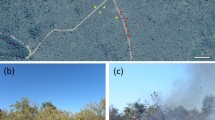Abstract.
The biodiversity of fire-dependent ecosystems is increasingly threatened by habitat fragmentation and fire suppression. Reducing species loss requires that salient features of natural fire regimes be incorporated into managed regimes. Lightning-season burns have been emphasized as the critical component of disturbance regimes that maintain native biodiversity within endangered longleaf pine savannas, the most diverse plant community in North America. Over evolutionary time, lightning-season fire is thought to have exerted strong selection pressure on plant pollinator interaction, flower production, and seedling establishment. In this study, season of burn had no effect on pollination activity of native legumes. Contrary to the conventional paradigm, we found a wide range of reproductive responses among dominant legumes in response to the season of burn treatments, suggesting that a variable fire season, rather than a single season of burn, is appropriate to maintain a greater variety of native species. We propose that varying the components of fire regimes, rather than selecting a particular fire regime, is likely to be important to conserve biodiversity in this and other fire-dependent communities.
Similar content being viewed by others
Author information
Authors and Affiliations
Additional information
Electronic Publication
Rights and permissions
About this article
Cite this article
Hiers, J., Wyatt, R. & Mitchell, R. The effects of fire regime on legume reproduction in longleaf pine savannas: is a season selective?. Oecologia 125, 521–530 (2000). https://doi.org/10.1007/s004420000469
Received:
Accepted:
Published:
Issue Date:
DOI: https://doi.org/10.1007/s004420000469




